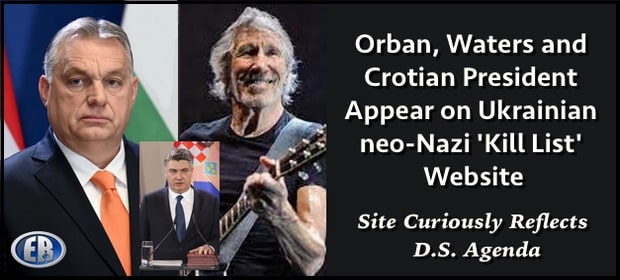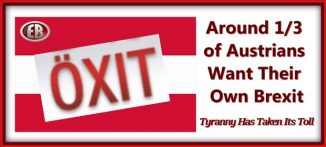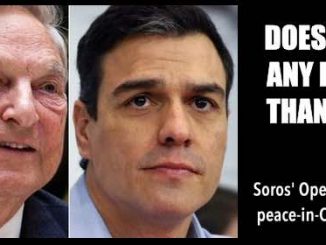
ER Editor: We’re publishing two pieces about this, one by Samizdat (RT) via AlethoNews, whom we thank for making the text fully available. RT and Sputnik News are both banned in the EU. And one from FreeWest Media.
We recommend browsing the sinister Myrotvorets (‘peacekeeper’) site, which is anything but (browsers should translate). Russia and Russians are continually referred to as ‘fascist’ or ‘Nazi’, and described as degenerate and immoral, not human. This is Orban’s entry and here is Roger Waters‘. On the top right of the site, the cities of Langley VA (home of the CIA) and Warsaw, Poland are curiously positioned. The NATO flag can be found as an approved symbol, as well as condemnation of the two Russian ‘perpetrators’ of the Skripals’ poisoning, which has never been proven, on the contrary. (The Skripals have mysteriously disappeared, by the way.) The site was established in 2014, around the time of the western-implemented Maidan coup, and a visit to the site as well as information reported below suggest strongly that it reflects the western Deep State agenda. Repeated calls to shut down the site have fallen on deaf ears. Funny that.
Did we say? RT and Sputnik News are unavailable in the EU but the Myrotvorets site isn’t.
********
Hungarian PM, Croatian president, Noble prize winner on Ukrainian ‘hit list’
Not only Hungarian Prime Minister Viktor Orban but also Croatian President Zoran Milanovic and a Nobel Prize winner have been listed on Myrotvorets, the Ukrainian intelligence database which acts as a hit list.
FREEWEST MEDIA
Sputnik described the website on Monday as a “notorious Ukrainian kill list”. In April 2015, Myrotvorets, [translated as Peacemaker] published the home addresses of Ukrainian writer Oles Buzina and former Verkhovna Rada parliamentarian Oleg Kalashnikov, “just days before they were assassinated,” according to Wikipedia.
Myrotvorets has outed Orban as an “anti-Ukrainian propagandist”. The Hungarian government has spoken out against an oil and gas embargo against Russia. A spokesman told Reuters news agency that Hungary had not changed its mind on the issue. If this veto is retained, a complete EU import ban would be off the table.
The EU think tank Bruegel estimated that before the war, Russia exported oil worth 450 million euros to the EU every day. In addition to Hungary, other EU countries such as Greece, Italy and Spain are worried about an oil boycott. They fear that consumer prices would continue to rise as a result. Even if an embargo is decided, it is still completely unclear when the measures will take effect.
On Sunday, Gergely Gulyas, the head of the Hungarian Prime Minister’s Office, confirmed that at least nine European countries opened accounts in rubles at Russian banks to enable gas payments, even if they do not wish to make this public, possibly for fear of being added to the death list.
‘Enemies of Ukraine’
The Ukrainian database publishes the personal data of the “enemies” of Ukraine. Sputnik reported that “several individuals whose names have been posted on the site have been murdered, and rights groups and governments have repeatedly called for it to be taken down”.
Kremlin critic and Nobel prize winner for literature Svetlana Alexievich is also on the death list ominously called ‘Peacemaker’. Wikipedia
“[Orban] is listed as an ‘accomplice of Russian war criminals,’ an ‘accomplice in the crimes of Russian authorities against Ukraine and its citizens’, for his ‘participation in acts of humanitarian aggression against Ukraine,’ as an ‘anti-Ukrainian propagandist,’ and for his general all-round ‘cooperation with the Russian aggressor’.”
“Orban’s specific ‘crimes’ include his refusal to allow weapons intended for Ukraine to be sent through his country’s territory, and his refusal to reject Russian gas supplies even in the long-term. The prime minister’s willingness to pay for Russian gas in rubles is also mentioned.”
Together with Orban, Croatian President Zoran Milanovic also appears on the list. “Milanovic ended up on the list for saying that Croatia will not in any way get involved in the Ukraine crisis in case of its escalation and that it will not deploy its troops there. He has also said that Ukraine does not belong in NATO and that the European Union triggered a coup in Ukraine in 2014 when the pro-Russian president Viktor Yanukovych was ousted,” Croatia’s state press agency HINA reported.
The list contains some 187 000 names, including former Pink Floyd member Roger Waters, who three years ago said Russia had more rights to Crimea than Ukraine did.
Even Kremlin critic, the Nobel Prize winner Svetlana Alexievich is on the list for mentioning that some ethnic Ukrainians had helped Nazis in the persecution of Jews during World War II.
Some 4,500 Western, Ukrainian, and Russian journalists accredited by the authorities of Donbass, a mandatory requirement for working in the area, later received death threats. FWM contributor, Manuel Ochsenreiter, who passed away last year, was one of them.
“The list is very dangerous and should be removed immediately. The tension is already high and it only adds fuel to the fire,” former Human Rights Watch official in Ukraine Yulia Gorbunova noted. The removal of the list has been requested repeatedly by the UN, G7 and EU ambassadors as well as human rights groups, but to no avail, HINA pointed out.
Source
********
Names of Hungarian PM, Croatian President Appear on Notorious Ukrainian Kill List Site
Samizdat (RT) via ALETHONEWS
Curated by the Security Service of Ukraine and officials from the Ministry of Internal Affairs, the Myrotvorets website publishes the personal info of so-called “enemies of Ukraine”. Several individuals whose names have been posted on the site have been murdered, and rights groups and governments have repeatedly called for it to be taken down.
Hungarian Prime Minister Viktor Orban’s name has appeared on the notorious Ukrainian website Myrotvorets.center (lit. “Peacekeeper”).
The 58-year-old politician is listed as an “accomplice of Russian war criminals”, an “accomplice in the crimes of Russian authorities against Ukraine and its citizens”, for his “participation in acts of humanitarian aggression against Ukraine”, as an “anti-Ukrainian propagandist”, and for his general all-round “cooperation with the Russian aggressor”.
Orban’s specific “crimes” include his refusal to allow weapons intended for Ukraine to be sent through his country’s territory, and his refusal to reject Russian gas supplies even in the long-term. The prime minister’s willingness to pay for Russian gas in rubles is also mentioned.
The site further recalled Orban’s 4 April statement about the forces Hungary has faced to remain independent, ranging from the local opposition to “the bureaucrats in Brussels, money and institutes of the Soros empire, international media as well as the Ukrainian president”.
Finally, the website points to Orban’s demands that Kiev’s post-2014 authorities respect western Ukraine’s sizeable ethnic Hungarian community, and provide residents of Zakarpattia with greater autonomy.
Along with Orban, Croatian President Zoran Milanovic’s name has also been added to the site. Milanovic is listed as an “accomplice of Russian invaders” for his alleged “humanitarian aggression against Ukraine” for “the spreading of Kremlin propaganda” and so-called “support and justification of Russian aggression against Ukraine”.
The site recalls Milanovic’s 2 February 2022 remarks that Russia must be “a factor” in the “equation” of European-wide stability, and his opposition to Ukraine joining NATO.
Former Russian President and Prime Minister Dmitry Medvedev, who now serves as deputy chairman of the Russian Security Council, suggested that Orban and Milanovic’s appearance on the notorious website was a sign that Ukraine’s neo-Nazi elements were dissatisfied with the amount of weapons, mercenaries, and money they have received from the West.
“At this rate, soon Ukrainian Nazis will personally carry out reprises against objectionable leaders and ‘separate the sheep from the goats’ directly in European capitals”, Medvedev wrote on his Telegram channel.
Hungary has refused to toe the line on the European Union’s anti-Russian policy in the wake of the escalation of the Ukraine crisis in February. On Sunday, Minister of the Prime Minister’s Office Gergely Gulyas said that Budapest has “made it clear” that it will “never support” extending EU sanctions against Russian energy imports, implying that it may veto Brussels’ plans to ban Russian oil.
Journalists, human rights groups, the G7, and the Russian Foreign Ministry have repeatedly called for Myrotvorets to be shut down, citing its use against the so-called “enemies of Ukraine” to murder, threaten, and intimidate individuals whose names have been listed there. Set up in 2014, the site has since amassed tens of thousands of names, ranging from Ukrainian opposition politicians and public figures to foreign officials, journalists, and businessmen.
In 2015, former Ukrainian lawmaker Oleg Kalashnikov and journalist and writer Oles Buzina were murdered after their personal data (including addresses) were posted on the site. Before he was killed, Kalashnikov repeatedly reported on threats being made against his life after his info was placed on the site. After he and Buzina were killed, Myrotvorets’ official Twitter handle mockingly joked about “the successful completion of a combat mission by agent 404” – a reference to the well-known HTTP 404 “not found” error.
Several other journalists and public figures listed on the site have subsequently been killed. Among the deceased is Andrea Rocchelli, an Italian independent journalist working in Donbass.
In 2015, the website began to publish the personal data of Russian military personnel involved in the anti-terrorist operation in Syria. Then-adviser to the Ministry of Internal Affairs Anton Gerashchenko publicly encouraged Daesh (ISIS) to “deal with” Russian troops under Sharia law. His comments prompted Russia’s Investigative Committee to open a criminal case against him over public calls for terrorist activities.
In 2016, Myrotvorets got its hands on leaked detailed personal data of some 5,000 Ukrainian, Russian, and Western journalists who had worked in Donbass. Among the records leaked was detailed personal information including phone numbers and addresses, and many of the journalists have reported threats against their lives.
Orban isn’t the first Hungarian to be added to the Myrotvorets list. In 2018, the website listed over 300 ethnic Hungarian residents from Zakarpattia who had “illegally” obtained Hungarian citizenship (Ukraine doesn’t allow dual citizenship, but much of the country’s political and business elite holds two or more citizenships anyway). In October 2018, Hungarian Minister of Foreign Affairs Peter Szijjarto blasted the site and the Ukrainian government, saying authorities in Kiev were using the website as part of a “hate campaign” in a desperate attempt to increase then-President Petro Poroshenko’s sagging approval ratings.
Source
************

••••
The Liberty Beacon Project is now expanding at a near exponential rate, and for this we are grateful and excited! But we must also be practical. For 7 years we have not asked for any donations, and have built this project with our own funds as we grew. We are now experiencing ever increasing growing pains due to the large number of websites and projects we represent. So we have just installed donation buttons on our websites and ask that you consider this when you visit them. Nothing is too small. We thank you for all your support and your considerations … (TLB)
••••
Comment Policy: As a privately owned web site, we reserve the right to remove comments that contain spam, advertising, vulgarity, threats of violence, racism, or personal/abusive attacks on other users. This also applies to trolling, the use of more than one alias, or just intentional mischief. Enforcement of this policy is at the discretion of this websites administrators. Repeat offenders may be blocked or permanently banned without prior warning.
••••
Disclaimer: TLB websites contain copyrighted material the use of which has not always been specifically authorized by the copyright owner. We are making such material available to our readers under the provisions of “fair use” in an effort to advance a better understanding of political, health, economic and social issues. The material on this site is distributed without profit to those who have expressed a prior interest in receiving it for research and educational purposes. If you wish to use copyrighted material for purposes other than “fair use” you must request permission from the copyright owner.
••••
Disclaimer: The information and opinions shared are for informational purposes only including, but not limited to, text, graphics, images and other material are not intended as medical advice or instruction. Nothing mentioned is intended to be a substitute for professional medical advice, diagnosis or treatment.





